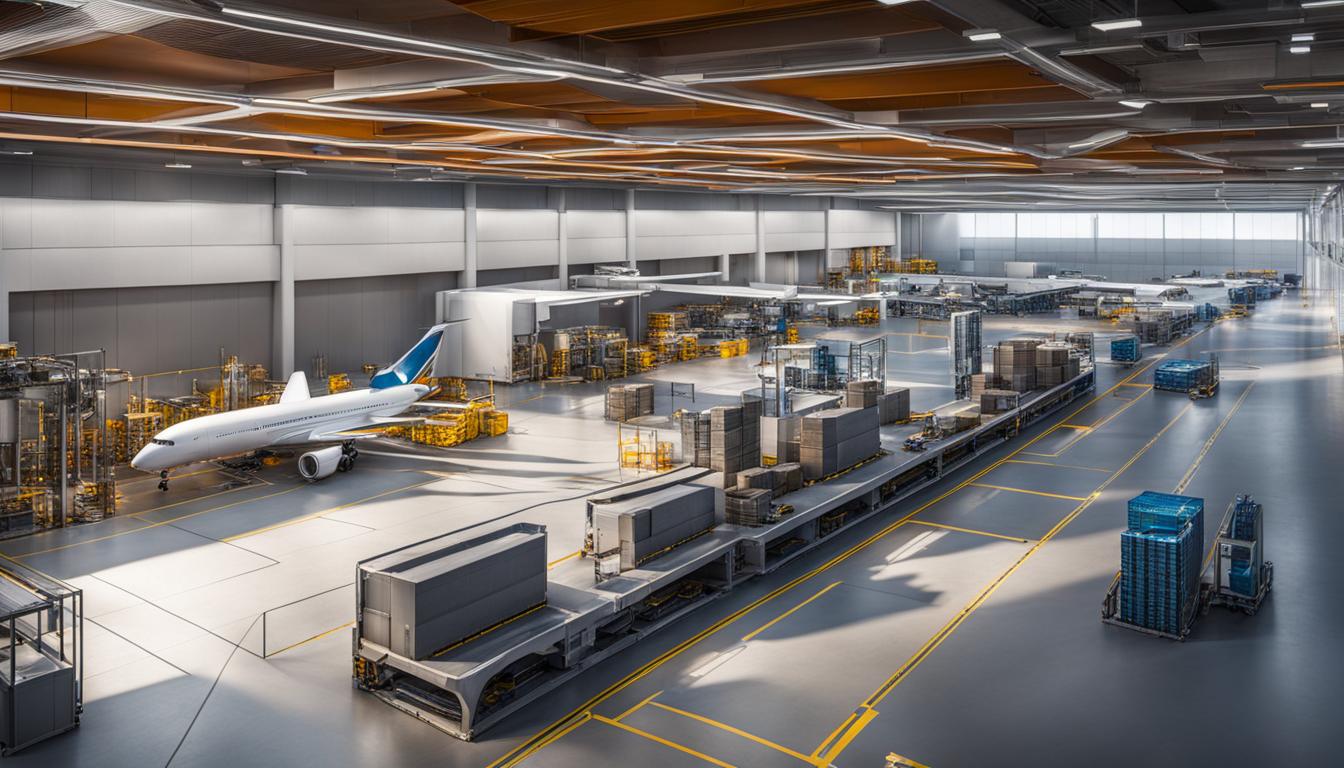Air cargo handling is undergoing a transformation with the introduction of AI-driven automation. This advanced technology is revolutionizing the way cargo is handled, improving efficiency, and streamlining processes. Robotic solutions and automated systems are paving the way for a more efficient and cost-effective air cargo industry. Let’s delve deeper into the world of AI-driven automation in air cargo handling.
Key Takeaways:
- AI-driven automation is reshaping the air cargo handling industry
- Robotic solutions and automated systems are improving efficiency in cargo handling
- Air freight frontrunners like Hong Kong International Airport Cargo Terminal are implementing AI-based technologies
- AI enables real-time tracking, logistics planning, and risk management
- The future of air cargo handling will be characterized by advanced automation and enhanced customer satisfaction
The Benefits of AI in Air Cargo Handling
The implementation of AI-based air cargo handling technologies has brought numerous benefits to the industry. The use of AI has significantly improved efficiency, reducing manual work and freeing up time for more valuable tasks. With AI, air cargo handlers can streamline workflows and processes, making operations more efficient and cost-effective.
One of the key benefits of AI in air cargo handling is improved logistics planning. AI enables forwarders to optimize shipping routes and transportation modes, leading to more efficient and timely deliveries. By leveraging AI’s actionable visibility and analytics, real-time tracking of shipments becomes possible, allowing for better collaboration between teams and ensuring smooth operations.
Another advantage of AI in air cargo handling is the enhanced risk and performance management it provides. AI technology can identify potential risks and optimize operational efficiency, helping air cargo handlers to mitigate risks and improve overall performance. This not only ensures the safety of cargo but also contributes to better customer satisfaction.
Table: Benefits of AI in Air Cargo Handling
| Benefit | Description |
|---|---|
| Streamlined workflows | AI reduces manual work and streamlines cargo handling processes, improving efficiency. |
| Optimized logistics planning | AI enables the optimization of shipping routes and transportation modes, leading to more efficient deliveries. |
| Actionable visibility and analytics | Real-time tracking of shipments and better collaboration between teams are possible with AI. |
| Risk and performance management | AI technology identifies potential risks and helps optimize operational efficiency, contributing to better performance and customer satisfaction. |
In conclusion, the benefits of AI in air cargo handling are significant. From streamlining workflows to optimizing logistics planning, AI-based technologies have revolutionized the industry. The integration of AI with other emerging technologies is expected to further enhance efficiency, accuracy, and safety in air cargo handling operations. As the industry moves towards advanced automation driven by AI, we can expect increased productivity and improved customer satisfaction in the future of air cargo handling.
The Future of Automation in Air Cargo Handling
The air cargo handling industry is on the brink of a technological revolution, with the future of automation driven by advancements in artificial intelligence (AI) technology. As we move forward, the integration of AI-based systems and solutions is expected to revolutionize the efficiency, accuracy, and safety of air cargo handling operations.
One of the key areas set to benefit from advanced automation is the use of robotics, autonomous vehicles, and drones in air cargo handling. These technologies have the potential to streamline processes, reduce manual labor, and optimize operational efficiency. For example, autonomous vehicles can transport cargo within the airport premises, while drones can be utilized for inventory management and surveillance of cargo handling areas.
AI applications in air cargo handling are not limited to physical operations alone. The integration of AI with technologies like blockchain and the Internet of Things (IoT) has the potential to transform air cargo management. By leveraging AI’s capabilities, cargo handlers can optimize routing and transportation, enhance security and traceability, and improve overall supply chain visibility.
Table: Advancements in AI and Automation in Air Cargo Handling
| Advancement | Description |
|---|---|
| Robotic Solutions | Utilization of robots for efficient cargo handling, reducing manual labor and human error. |
| Autonomous Vehicles | Integration of autonomous vehicles for cargo transportation within airport premises. |
| Drones | Usage of drones for inventory management and surveillance of cargo handling areas. |
| Blockchain Integration | Utilizing blockchain technology to enhance security, traceability, and transparency in air cargo management. |
| Internet of Things (IoT) | Integration of IoT devices for real-time monitoring, data collection, and analysis in air cargo handling. |
The future of automation in air cargo handling holds immense potential. As AI technology continues to advance, we can expect to see even more innovative applications that enhance efficiency, accuracy, and safety in the industry. With the ongoing integration of AI with other emerging technologies, the air cargo handling landscape is set to undergo significant transformation, shaping the future of the entire air freight industry.
Optimizing Air Cargo Handling with AI
AI-driven automation is revolutionizing the air cargo handling industry, providing valuable solutions to optimize operations and improve efficiency. With the implementation of AI-based air cargo handling technologies, handlers can streamline processes, reduce costs, and enhance overall performance.
One of the key benefits of AI in air cargo handling is the use of robotic solutions and automated systems. These technologies enable faster and more accurate cargo handling by minimizing manual labor and human error. By leveraging AI-driven automation, handlers can achieve higher levels of productivity and ensure the timely and secure delivery of shipments.
AI’s Role in Workflow Management
AI also plays a crucial role in workflow management, providing real-time data analysis to identify potential bottlenecks and optimize operations. By analyzing data, AI systems can help handlers make informed decisions, allowing for efficient allocation of resources and proactive maintenance of equipment.
Furthermore, AI-driven automation enables improved visibility and tracking of shipments. Real-time tracking and analytics allow for better collaboration between teams, enabling handlers to respond quickly to any disruptions or delays. This level of transparency enhances customer satisfaction by providing accurate and up-to-date information regarding the status and location of their cargo.
The Way Forward with AI in Air Cargo Handling
As the air cargo industry continues to evolve, AI-based technologies will continue to play a pivotal role in optimizing handling processes. The integration of AI with other emerging technologies such as blockchain and IoT will further enhance efficiency and security in air cargo management.
| Benefits of AI in Air Cargo Handling | Optimized workflow management |
|---|---|
| Improved accuracy and productivity | Efficient resource allocation |
| Real-time tracking and analytics | Enhanced transparency and customer satisfaction |
| Reduced costs and human error | Proactive maintenance |
In conclusion, AI-driven automation offers significant advantages in optimizing air cargo handling. By leveraging AI-based technologies, handlers can achieve higher efficiency, accuracy, and customer satisfaction. As the industry continues to embrace AI and integrate it with other technologies, the future of air cargo handling will be characterized by advanced automation, streamlined workflows, and enhanced performance.
Conclusion
The use of AI-driven automation in air cargo handling has revolutionized the industry, providing numerous benefits and shaping the future of automation in this field. The implementation of AI-based technologies has significantly improved the efficiency, accuracy, and safety of air cargo handling operations.
With advancements in AI technology and the integration of AI with other emerging technologies, the future of air cargo handling looks promising. The industry is moving towards a more automated and interconnected system that will optimize processes and enhance overall performance.
AI-based solutions have streamlined workflows, reduced costs, and improved customer satisfaction in air cargo handling. The ability to leverage AI-driven automation, robotic solutions, and automated systems has resulted in faster and more accurate cargo handling, minimizing manual labor and human error. Real-time data analysis enabled by AI helps identify bottlenecks and optimize workflow management, leading to higher productivity levels.
As the air freight industry continues to evolve, AI will be a key driver in shaping the future of automation in air cargo handling. With the potential for advanced robotics, autonomous vehicles, and drones, as well as the integration of AI with emerging technologies like blockchain and IoT, we can expect further optimization, innovation, and enhanced customer satisfaction in the years to come.
- Customer Engagement and Loyalty: Innovating the Future of Saudi Arabia’s Dedicated Cargo Airline - December 23, 2024
- Regulatory and Compliance: Pioneering the Future of Saudi Arabia’s Dedicated Cargo Airline - December 21, 2024
- Financial Strategies: Fueling the Growth of Saudi Arabia’s Dedicated Cargo Airline - December 20, 2024






